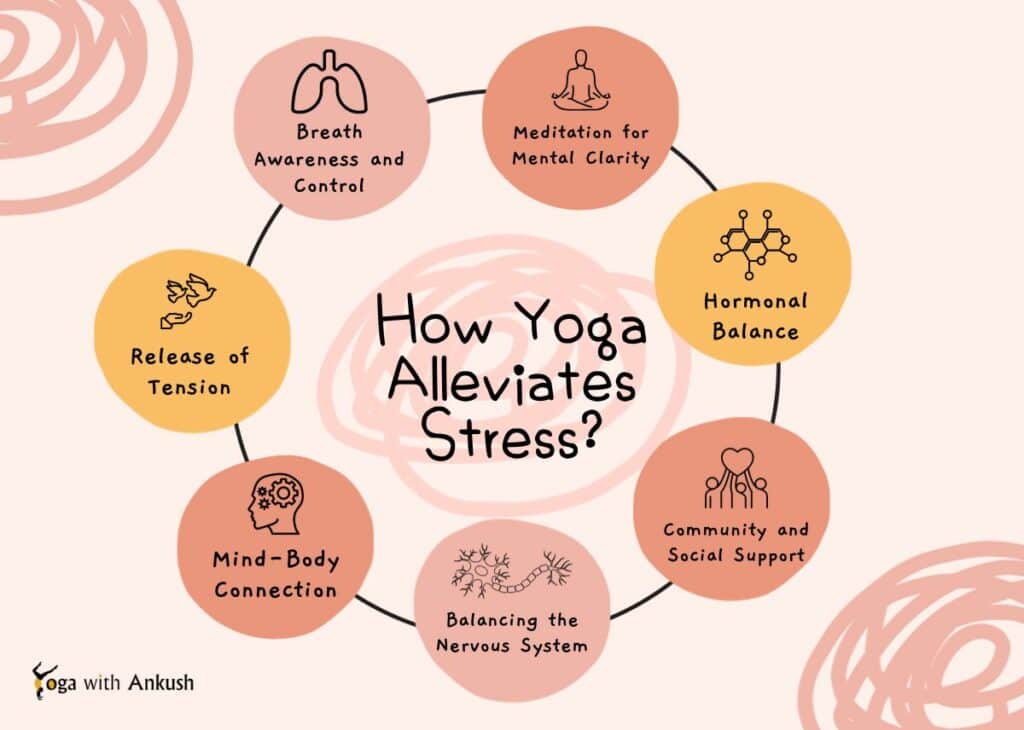In the fast-paced, modern world, stress has become an unwelcome companion for many. The demands of work, family, and daily life can take a toll on our mental and physical well-being.
Fortunately, an ancient practice has emerged as a beacon of tranquility in the chaos—yoga.
This age-old discipline not only promotes physical fitness but also offers a profound antidote to stress. In this article, we will delve into the various ways in which yoga helps alleviate stress, fostering a sense of calm and balance.
Table of Contents
Understanding Stress
Before we explore the therapeutic benefits of yoga, it’s essential to understand stress and its impact on our overall health.
Stress is the body’s natural response to challenges, and in moderation, it can be beneficial. However, chronic stress, often a result of prolonged exposure to demanding situations, can lead to a cascade of negative effects on both mental and physical health. Conditions such as anxiety, depression, high blood pressure, and cardiovascular diseases are often linked to persistent stress.
Yoga as a Stress Buster
Yoga, originating from ancient Indian philosophy, is a holistic practice that harmonizes the mind, body, and spirit. Its multifaceted approach involves physical postures (asanas), breath control (pranayama), meditation, and ethical principles.
Together, these components create a powerful synergy that not only enhances flexibility and strength but also cultivates a profound sense of inner peace, making it a potent tool in stress management.
How Yoga Alleviates Stress?

1. Balancing the Nervous System
Yoga is renowned for its ability to balance the autonomic nervous system, which comprises the sympathetic and parasympathetic branches. The sympathetic system, associated with the “fight or flight” response, becomes dominant during times of stress.
Through yoga, especially practices like deep breathing and restorative poses, the parasympathetic nervous system is activated, promoting relaxation and counteracting the stress response.
2. Mind-Body Connection
One of the unique aspects of yoga is its emphasis on the mind-body connection. Asanas are not merely physical exercises but involve a mindful awareness of breath, movement, and sensations.
This heightened awareness helps individuals stay present, preventing their minds from dwelling on past regrets or future anxieties, a common source of stress.
3. Release of Tension
Physical tension often accompanies stress, manifesting as tight muscles and aching joints. Yoga postures systematically release tension in various parts of the body, promoting flexibility and reducing physical discomfort.
Practices like Yin Yoga, with its prolonged holds and deep stretches, are particularly effective in releasing stored tension.
4. Breath Awareness and Control
Pranayama, or breath control, is a fundamental aspect of yoga. Deep, rhythmic breathing has a direct impact on the nervous system, signaling the body to relax.
Techniques such as diaphragmatic breathing and alternate nostril breathing not only induce a state of calm but also enhance lung capacity, promoting better oxygenation of the body.
5. Meditation for Mental Clarity
Meditation is a cornerstone of yoga that fosters mental clarity and emotional resilience. By training the mind to focus on the present moment, individuals can break free from the cycle of stress-inducing thoughts.
Mindfulness meditation, in particular, has gained recognition for its effectiveness in reducing stress and promoting overall well-being.
6. Hormonal Balance
Chronic stress can disrupt hormonal balance in the body, leading to an overproduction of stress hormones like cortisol.
Yoga practices have been shown to modulate hormonal activity, reducing cortisol levels and promoting the release of endorphins, the body’s natural mood enhancers.
7. Community and Social Support
Many individuals find solace and support in yoga communities. Attending group classes or workshops provides a sense of belonging and social connection, which can be instrumental in managing stress.
The shared experience of practicing yoga creates a supportive environment where individuals can share their struggles and triumphs.
Conclusion
In the quest for stress relief, yoga emerges as a holistic and accessible solution. By addressing the interconnectedness of the mind, body, and spirit, yoga offers a comprehensive approach to stress management.
Whether through the gentle flow of asanas, the rhythmic breath of pranayama, or the serenity of meditation, yoga provides a toolkit for individuals to navigate the challenges of modern life with resilience and inner calm. Embracing yoga as a regular practice can be a transformative journey towards a stress-free and balanced life.
Also Read:


